Comedian Alice Fraser tests her jokes on live audiences. Why? As she explains throwing half-baked one-liners at a lone person is a terrible way to treat a friend.
If you have a Jewish father, a Catholic mother, and you’re raised Buddhist, what does that make you? Oppressed, repressed, and depressed, according to lawyer-turned-comedian Alice Fraser. Fraser, who began her career as a graduate in the corporate real estate team at Allens, speaks to LSJ during a brief pause between the Melbourne International Comedy Festival and Sydney Comedy Festival in May. When we speak – in the optimistic period before COVID-19 once again wreaks havoc on the east coast – she is thrilled to be performing in front of live audiences.
“It’s delightful to be able to have a conversation with people again, a real two-way conversation, instead of screaming into the void through podcasts which is what I’ve done for the past year,” she says. “There’s a lot of back-and-forth in comedy, we change what we do depending on not just if the audience laughs, but how they laugh. When to push, when to back off. A lot of it is crowd management, really.”
Her show this year is called Chronos, which explores the concepts of time and attention. One of the things she’s noticed over the past few years, she explains, is that the more attention people give a certain thing, the closer it gets to their viewfinder. It’s all about perspective.
“So many of the discussions I see online, both sides are right, but they’ve lost all perspective of how important that thing actually is.
“Take men’s rights – there are unfair outcomes and things that happen when the courts make decisions by default … you see it all the time, competing sides where neither party is wrong but an outlier has taken up your whole view.”
It’s one of the things Fraser enjoys most about comedy: the ability to explore big topics in a way that really makes people think. Her shows combine straight-talking gut punches with sharp one-liners and a fair bit of silliness, creating narrative arcs that balance abundant laughs with emotional resonance. Unsurprisingly, her out-of-the-box upbringing is a constant source of inspiration for her shows.
“I’ve always had to explain myself, which is a source of a lot of comedy,” she says. “I’ve never wanted to be a box in a drop-down column, I always want to click ‘other’.

Comedy has a lot of people who just say the truth. They don’t conform. It’s like a compulsive need to say whatever you’re thinking, and articulate the things people are thinking but not saying.
“I think all comedians are outsiders in one way or another – society doesn’t fit like a glove, so small things become much more visible. It gives you empathy. What I want to do with my comedy for the most part is make people feel more human.”
The more specific she is, Fraser observes, the more people can see themselves in her stories. It could be about her cockroach-infested childhood kitchen, the fact that her grandmother is the kindest bigot in the world, that she wants you to find her mind sexy, or that she didn’t become a feminist on purpose.
“Comedy has a lot of people who just say the truth. They don’t conform. It’s like a compulsive need to say whatever you’re thinking, and articulate the things people are thinking but not saying,” she says. “I find that deeply reassuring, knowing that these are people who are never going to fall in line.”
Fraser fell in love with comedy through theatre sports, which she began while studying Arts/Law at the University of Sydney. At first it was just a hobby while she chased a more high-flying career path – a master’s degree in English Literature (Rhetoric) at the University of Cambridge, followed by an internship at an investment bank in New York City and a job at a top-tier law firm. However, when she realised she didn’t see a future for herself in legal practice, she turned to comedy full-time.
“One of the things about women is if you do well at school, you don’t necessarily fail very much, and I think that’s a terrible thing,” she says.
“Genuinely, it’s one of the biggest barriers to the success of women, especially now that so much success can come through things like entrepreneurship, where there aren’t any gatekeepers. We need to learn that people will still love us when we fail.”
That’s what made comedy so intoxicating, especially in the early stages. Fraser learnt to fail again, and again, and again, and again, because it was the only way to improve. It was incredibly freeing, she says, because she was suddenly released from worrying about how to dress, how to speak, how to think, and how to interact with others. For the first time, all she had to do was focus on honing her craft.
When she’s not on stage, she writes and records. Her jokes have appeared on BBC Radio 4 and Channel 10’s The Project. She has three comedy specials available on Amazon Prime and she’s written for SBS Comedy and The Chaser Quarterly. She’s even given a TEDx talk doing a deep dive into death.
“I lost my imposter syndrome last year, because I did a daily satirical podcast set in an alternate dimension,” she laughs. “I wrote jokes for 365 days straight – I did a different ad every day for half a glass of water. Once you do that, you never worry about running out of ideas again.
“At the bottom of the well, there’s always another half a glass of water.”




